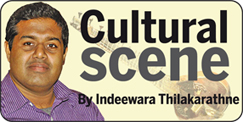|
GLF and the issue of translation:
Translator and Translated
 "
Mark Antony: "
Mark Antony:
Friends, Romans, countrymen, lend me your ears;
I come to bury Caesar, not to praise him;
The evil that men do lives after them,
The good is oft interred with their bones,
So let it be with Caesar ... The noble Brutus
Hath told you Caesar was ambitious:
If it were so, it was a grievous fault,
And grievously hath Caesar answered it ...
Here, under leave of Brutus and the rest,
(For Brutus is an honourable man;
So are they all; all honourable men)
Come I to speak in Caesar's funeral ...
He was my friend, faithful and just to me:
But Brutus says he was ambitious;
And Brutus is an honourable man….
He hath brought many captives home to Rome,
Whose ransoms did the general coffers fill:
Did this in Caesar seem ambitious?
When that the poor have cried, Caesar hath wept:
Ambition should be made of sterner stuff:
Yet Brutus says he was ambitious;
And Brutus is an honourable man.
You all did see that on the Lupercal
I thrice presented him a kingly crown,
Which he did thrice refuse: was this ambition?
Yet Brutus says he was ambitious; …"
- Julius Caesar by William Shakespeare
(Mark Anthony's speech is one of the finest examples of suggestive
meaning or Davanitarta (suggestive meaning) in a text in English
literature)
In this week's column, I would like to discuss issues facing the
translation industry against the backdrop of the Galle Literary Festival
(GLF) of 2011 and the session on translation entitled Translator and
Translated.
The GLF session Translator and Translated featured Ranjini Obeysekere
and Liyanage Amarakeerthi and was moderated by Tissa Jayatilake. He
introduced two panellists and said that Ranjini Obeysekara as one who
has received her entire education in English, while Liyanage
Amerakeerthi received his education in Sinhalese and both have developed
interests in Sinhalese and English later on. It was also clear that the
moderator, Tissa Jayatilake had his education in English medium (Subject
to correction).
One of the fundamental issues arising from the session Translator and
Translated is that whether one who is proficient only in one language or
in other words, could a monolingual simply claim that she/he is a
translator? What would be the quality of the translated work by such a
translator?
A cardinal principle that a translator should bear in mind is that
the original text (in Source Language) is from one literary culture and
the translated text (in Target Language) will belong to a different
literary culture. That difference among European literary cultures such
as English, French, German and Spanish may be lesser than the one
between Sinhalese literary culture and English or other European
literary cultures. Naturally, the translation from non-European language
to European language and vice versa will be far more difficult and
cumbersome than a translation from one European language to another.
Suggestive meaning in a text
During the session, Ranjini Obeysekere and Amarakeerthi Liyanage
explained briefly how they came into translations and how they have
developed a passion for Sinhalese and English respectively. Among other
things, Ranjini Obeysekere said though she had received her education
entirely in English and she had been exposed to Sinhalese literature
during her childhood and that she acquired her knowledge of Sinhalese
only by reading. She stressed the point that it is not necessary to
study a language and almost all language skills could be acquired
through passionate reading. Though the statement may be accurate to a
certain extent, it is polemical given the fact that one should master
languages in order to be a skilful translator.
According to Amerakeerthi, he has considered translation as a
pertinent means to acquire English language skills. However, the
question remains why Amarakeerthi was chosen to represent Sinhala
writers or poets at GLF 2011 for that matter. In this regards, I would
like to quote form Malinda Seneviratne who wrote a column last week on
this particular session.
"It is a pity indeed that even in their condescension, the GLF-people
didn't see fit to invite people like Gunadasa Amarasekera, Siri
Gunasinghe, Ashley Halpe, Lakshmi De Silva, Gamini Seneviratne and
others of that generation equally conversant in Sinhala and English (I
am sure there are Tamil equivalents too), familiar with a wide range of
literatures and writers of repute. If they wanted to go 'younger', they
could have drawn people like Udayasiri Wickramaratne (poet, novelist and
dramatist), Rajitha Dissanayake (dramatist), Prasanna Vithanage
(film-maker and dramatist), Jayantha Chandrasiri (film-maker, dramatist)
or others in the university system who could speak to relevant issues."
At the conclusion of the session, a question was asked whether it is
possible to translate Davanitarta or suggestive meaning in Sinhalese
text into English. Having translated Davanitarta as resonant in English,
panellists dodged the question whether 'resonant' in one language can be
translated into another. Mark Antony's famous speech in William
Shakespeare's Julius Caesar is one of the finest examples of Davanitarta
or suggestive meaning in English literature. It is the way in which Mark
Anthony delivers the speech which changes the meaning of the text from
one which praises those who achieved power to one which is against them.
Another issue which dodged off was the selection of texts from source
language for translation. Given the present English translations of some
of the Sinhalese novels and poems, it is pertinent to ask the question
why these Sinhalese trash should ever be translated into English. A
dirty clothe with scars cannot be washed to remove its scars whether it
is washed in a remote village in Kurunagala or at a laundry in the USA.
|

